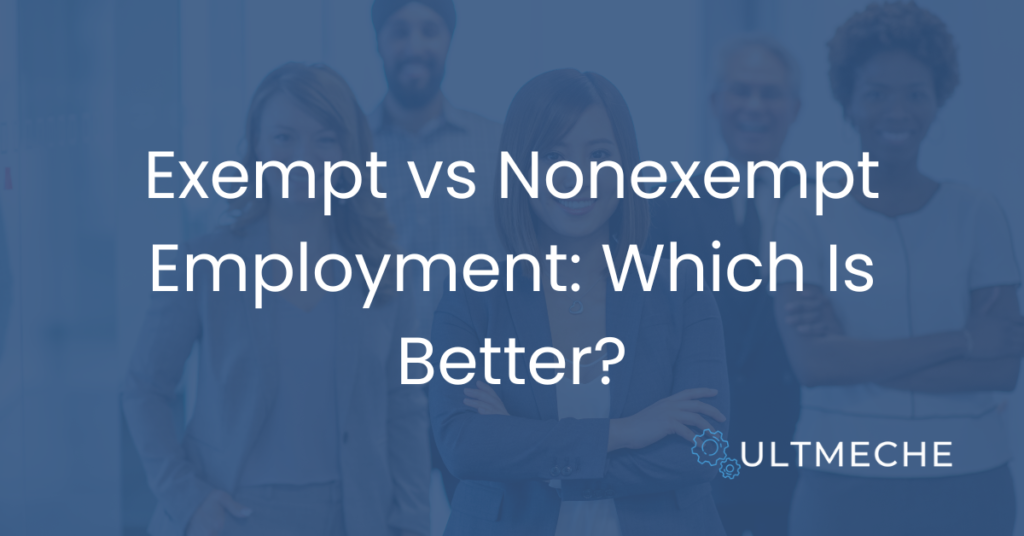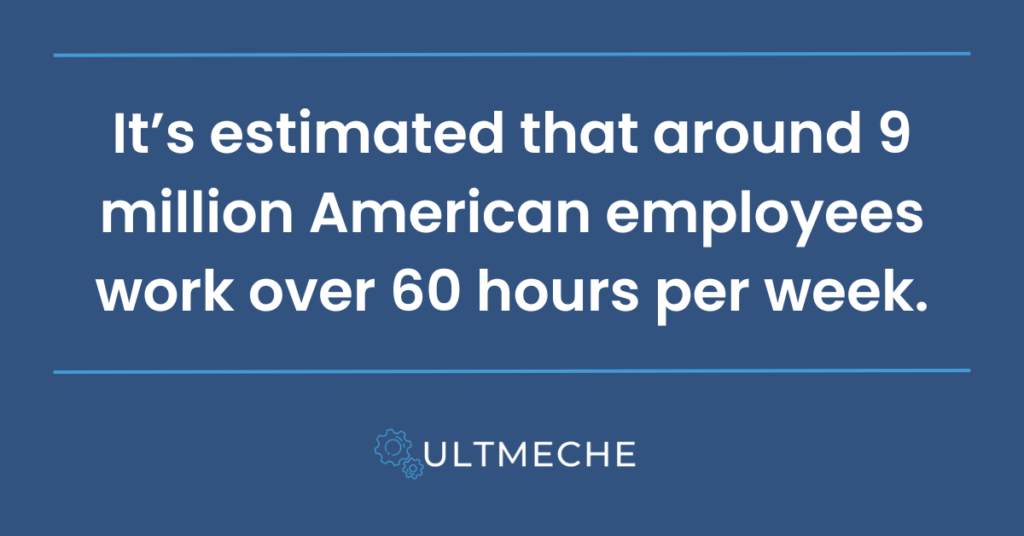Exempt vs nonexempt employment is just one of many considerations that ambitious applicants need to make when exploring the competitive job market. Not only can it influence short-term earnings, but it can have a long-term impact on the direction of your career, your work-life balance and the managerial level at which you enter a company.
What exactly are the differences between exempt and nonexempt employment, and which is the better choice?

What Is Exempt Employment?
Exempt employees are, as the title implies, exempt from certain labour laws, such as overtime pay regulations.
In most cases exempt employees are those in executive, administrative, or professional roles who work for a fixed salary. This often means that if they need to work overtime they are not financially compensated.
There are some roles that are exempt by default, but in most cases, an employee must fit three requirements to be classified as “exempt”.
- The annual payment should be a minimum of $23,600 ($455 per week).
- Payment must be on a salary basis.
- The employee should perform “exempt” job duties.
These requirements are defined by FLSA Regulations.
What Is Nonexempt Employment?
Nonexempt employment, on the other hand, covers roles that are subject to labour laws, including overtime pay for hours worked beyond the standard working week (usually 40 hours.)
Non-exempt status focuses on fair payment for time worked and allows employees to work overtime to make more money when needed. Employees should consider the availability of overtime in these roles as some industries will be able to offer far more hours than others.
Exempt vs Nonexempt Employment Pros and Cons
There are, of course, advantages and disadvantages of exempt and nonexempt employment. If you’re exploring exempt vs nonexempt employment, these benefits and drawbacks can be very influential in deciding which roles are best for you.

Exempt Employment
Firstly, let’s look at the benefits and drawbacks of exempt employment status.
Pros
Salary Stability: The biggest benefit of exempt employment is the financial stability it offers. Exempt employees enjoy a stable and predictable salary which can make saving and planning for the future far more simple.
Greater Flexibility: Exempt roles may offer more flexibility in working hours, allowing employees to better manage their schedules. Employers understand that employees will be paid for the same amount of time regardless of when they work, so it can allow flexible working.
Career Advancement: Many high-level positions, crucial for career growth, fall under the exempt category. This is because businesses like to plan ahead in terms of salary spend for high paying roles, and these roles are usually more objective-focused.
Most often, those seeking managerial positions will be exploring roles that fit into the “exempt” category.
Cons
Limited Overtime Pay: Exempt employees are not eligible for overtime pay, potentially leading to longer working hours without extra compensation.
Overworking: Many exempt roles are objective-based. Sometimes this means working longer hours. This can make employees lose motivation and experience burnout when there is no financial compensation.
Scheduling Rigidity: Whilst some employers will allow flexible working, some may not be able to. This can make it much more difficult if you ever need to take time off or navigate a complicated home schedule. Where non-exempt employees may be able to work more or fewer hours (and be compensated accordingly), exempt workers may need to work the required number of hours in a very specific window.
Nonexempt Employment
Next, let’s explore the pros and cons of nonexempt employment roles.
Pros
Overtime Pay: Overtime pay is a huge benefit for non-exempt employees, and for many, this earning potential offsets the stability of predetermined income that exempt roles offer. Nonexempt employees are able to receive additional compensation for overtime hours, providing financial rewards for extra effort.
Clear Work-Life Boundaries: Nonexempt roles often come with clearer boundaries, allowing employees to maintain a healthier work-life balance. When paid hourly, it’s easier to switch off from work-related responsibilities.
Fair Compensation: Nonexempt workers receive fair compensation for their time. It can be motivating to know that if a shift requires you to work for an extra hour, you will be paid accordingly. This provides opportunities to earn more money when needed, an option that doesn’t exist for exempt employees.
Cons
Income Variability: The lack of income stability can be a risk for those in nonexempt employment. Overtime availability may vary according to season or even business success, impacting the consistency of income for workers.
Less Control: Nonexempt employees can have less control over when they work and for how long. Overtime relies on the availability of extra work and this isn’t something that most employees have control over.
Tiring Shift Patterns: Due to nonexempt employment having less stability, it can be tempting to work longer and more difficult hours when the opportunity for overtime arises. This can be tiring and lead to burnout.
Exempt vs Nonexempt: Which Is Best?
Both types of employment have their benefits, and as you examine exempt vs nonexempt employment, it’s important to consider which would be best for you. Your salary requirements and desire for flexibility could very much impact which path you choose to follow.
If you are looking for a high level of autonomy, and are primarily seeking managerial or executive roles, exempt employment is a practical choice. Exempt employees, often salaried, enjoy more flexibility in their schedules, and an outcome-oriented approach to compensation.
For those who want a good work-life balance and aren’t concerned about getting a consistent salary, nonexempt work can be a good option. Not only is there some potential for more earnings, but it offers flexibility in when you do overtime and allows for employees to switch off from work when at home.
Landing Your Dream Role

Creating a tailored resume is important for landing your next role. It helps you stand out in what is a very competitive market. Whether you use bullet points or the XYZ format, your chosen style affects how appealing your resume is.
Before working on your resume, research the job and company. Understand the skills they want, note keywords, and learn about the company culture. Decide if an exempt or non-exempt role suits you.
Need more help? Try a resume review or get coaching for your interview. Land your dream job.
About the author

Mollie Buttery
Writer | SEO | Articles & Blog Posts | Social Media
Mollie supports ULTMECHE through website growth, social media, SEO, and other digital marketing tricks. Mollie has 10+ years experience of in house and freelance marketing experience in industries such as Finance, Law, SAAS, Automotive, Building Services, Commerce, and more. Some of her favorite writing topics consist of sports and finance. Mollie has been key to the growth of ULTMECHE’s SEO and digital marketing efforts.

2 thoughts on “Exempt vs Nonexempt Employment: Which Is Better?”